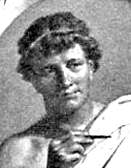Ovid On "Woman"
RETURN
edited 8/19/11
|
Publius Ovidius Naso was widely popular and his controversial literary work comprises erotic poetry, mythological poetry and poetry of exile. While at the height of his fame, he was mysteriously exiled to a bleak Roman outpost on the Black Sea. According to some sources, the exile was his punishment for seducing several prominent women, among them Julia, the only child of Caesar Augustus. Perhaps as a result of two unsuccessful marriages and innumerable successful love affairs, Ovid came to see women as vain, frail, and inconstant creatures whose main goal in life was to deceive men and be deceived by them. To him women were willing objects of lust who responded to sexual advances as a fine instrument responds to the touch of a great musician. Ovid believed that all women were seducible and that they “simply wished to give unwillingly what they really like to give.” . |
Ovid
(3 B.C.-18 A.D) -- |
|
A
chaste woman is one who has not been propositioned. Whether
they give or refuse, it delights women to have been asked. First
let assurance come to your minds, that all women can be caught; spread but your
nets and you will catch them. Sooner
would birds be silent in spring, or grasshoppers in summer . . . than a woman persuasively wooed
resist a lover: Nay, even she, whom you will think cruel, will be kind. A
woman, no less than the populace, a judge, or a chosen senate, will surrender
defeated, to eloquence. Many
women long for what eludes them, and like not what is offered them. For
a woman to give herself to a man is no more wasteful than taking a light from a
torch, or using water when it [A
woman] is constant only in her inconstancy. To
no woman is her own personal appearance displeasing. What
one beholds of a woman is the least part of her. Thus
neither with thee [woman] nor without thee, can I live. The
words of women [are] lighter than falling leaves. |
